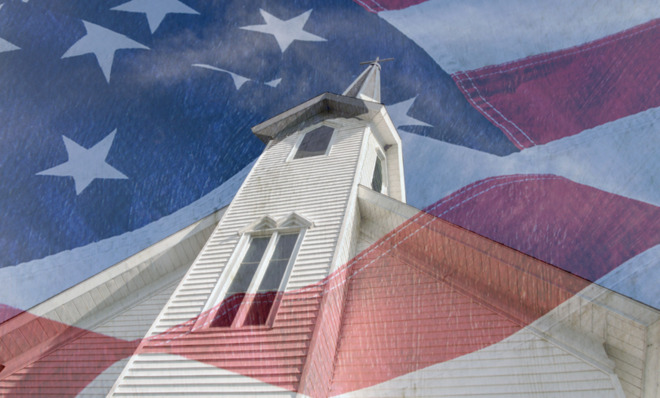The IRS needs to start investigating churches
Otherwise, they could turn into tax-exempt PACs

A free daily email with the biggest news stories of the day – and the best features from TheWeek.com
You are now subscribed
Your newsletter sign-up was successful
At first, the political ad seemed noteworthy only for its inconsistent use of capital letters.
A political action committee was running the full-page ad in a small weekly newspaper in Jackson, Mississippi, urging Democrats to vote for Sen. Thad Cochran in the state Republican primary against his Tea Party rival. Nothing earth-shattering — that is, until a New York Times reporter investigated the political action committee that paid for the ad and found that it shared an address with a local and influential church. The PAC also named the church's treasurer as its chief financial officer.
This kind of overlap is both disturbing and seemingly illegal. Churches are given tax-exempt status on the condition that their resources cannot be used for any political activity — including endorsing candidates. It's one side of a delicate agreement between church and state: The government doesn't tax churches, lest it stifle their religious expression. The other side of that deal is that religious organizations aren't allowed to use their privileged status to wield influence in politics. This doesn't mean that pastors and church staff can't talk about candidates or campaigns on their own time. But while they're on the clock, church employees can't fundraise for candidates, donate to them, endorse them, or do anything else that might help (or hurt) then. If they do, their church risks losing its coveted tax exemption.
The Week
Escape your echo chamber. Get the facts behind the news, plus analysis from multiple perspectives.

Sign up for The Week's Free Newsletters
From our morning news briefing to a weekly Good News Newsletter, get the best of The Week delivered directly to your inbox.
From our morning news briefing to a weekly Good News Newsletter, get the best of The Week delivered directly to your inbox.
So why would the Mississippi church make such a legally dicey move? The answer is simple: The IRS, which is responsible for auditing religious organizations that violate the law against electioneering, hasn't investigated a single church since 2009, when a federal judge threw out its case against a Minnesota megachurch that had allegedly endorsed Michele Bachmann. The judge wanted the IRS division that regulates churches to clarify its hierarchy — something that should have been easy enough to do. But the IRS still hasn't made the fix, effectively declaring a de facto moratorium on church audits.
This is not because pastors have been scrupulous about toeing the church-state line. Since 2008, several dozen ministers have participated in an event called "Pulpit Freedom Sunday," sponsored by the right-wing Christian legal organization Alliance Defending Freedom, where they openly defy the law by endorsing candidates from the pulpit. Some even sent their sermons to the IRS. They reason that if the IRS audits a church, they can react with a lawsuit, arguing in court that the Johnson Amendment — the 1954 law that prohibited tax-exempt organizations from participating in political campaigns — is unconstitutional.
Church-state separation groups are also hoping for a court challenge, so that a judge could force the IRS to act. The Freedom From Religion Foundation is suing the IRS for failing to investigate the many religious figures who have made political statements in their sermons or church bulletins.
Groups like the Alliance Defending Freedom say that preventing church officials from speaking their mind about politics is a form of censorship. But religious organizations have entered into a contract of sorts with the government, where they receive a sizeable financial benefit — tax exemption — in exchange for certain forms of oversight. And this isn't about targeting GOP-friendly religious institutions (the Mississippi ad, after all, was targeted at Democrats), or stifling Christian freedom of expression. The prohibition on electioneering should apply equally to all houses of worship — be they Jewish, Muslim, Hindu, Christian, or any other faith.
A free daily email with the biggest news stories of the day – and the best features from TheWeek.com
The issue isn't just the influence that religious leaders have over their congregations. Links between churches and PACs could be an easy way to funnel money into campaigns, tax-free. It would upset the balance between church and state; religious organizations would have unprecedented financial sway in political affairs.
There's a simple solution to all of this — one that Mike Huckabee, of all people, endorsed. If churches want to participate in political activity, they should give up their tax-exempt status. But religious organizations will have no incentive to think critically about these issues unless the IRS starts enforcing the law and auditing church officials who step over the line. Until then, we can expect to see more fishy relationships between PACs and religious institutions like the Mississippi church.
-
 The ‘ravenous’ demand for Cornish minerals
The ‘ravenous’ demand for Cornish mineralsUnder the Radar Growing need for critical minerals to power tech has intensified ‘appetite’ for lithium, which could be a ‘huge boon’ for local economy
-
 Why are election experts taking Trump’s midterm threats seriously?
Why are election experts taking Trump’s midterm threats seriously?IN THE SPOTLIGHT As the president muses about polling place deployments and a centralized electoral system aimed at one-party control, lawmakers are taking this administration at its word
-
 ‘Restaurateurs have become millionaires’
‘Restaurateurs have become millionaires’Instant Opinion Opinion, comment and editorials of the day